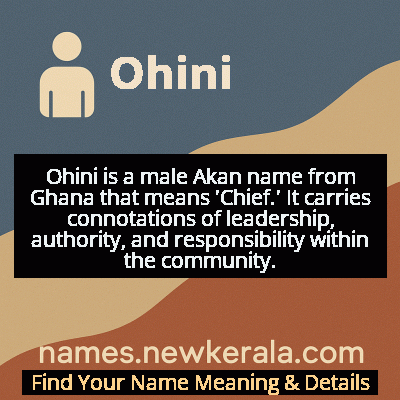Ohini Name Meaning & Details
Origin, Popularity, Numerology Analysis & Name Meaning of Ohini
Discover the origin, meaning, and cultural significance of the name OHINI. Delve into its historical roots and explore the lasting impact it has had on communities and traditions.
Name
Ohini
Gender
Male
Origin
African
Lucky Number
1
Meaning of the Name - Ohini
Ohini is a male Akan name from Ghana that means 'Chief.' It carries connotations of leadership, authority, and responsibility within the community.
Ohini - Complete Numerology Analysis
Your Numerology Number
Based on Pythagorean Numerology System
Ruling Planet
Sun
Positive Nature
Leaders, ambitious, highly driven, self-reliant, innovative.
Negative Traits
Overly aggressive, domineering, impatient, selfish.
Lucky Colours
Red, orange, gold.
Lucky Days
Sunday.
Lucky Stones
Ruby, garnet.
Harmony Numbers
2, 3, 9.
Best Suited Professions
Entrepreneurs, managers, engineers.
What People Like About You
Courage, determination, leadership.
Famous People Named Ohini
Ohini Addo
Traditional Ruler
Renowned chief of the Akyem Abuakwa traditional area who led his people during colonial resistance
Ohini Mensah
Educator and Community Leader
Established one of the first formal schools in the Eastern Region of Ghana
Ohini Boateng
Cultural Preservationist
Leading figure in preserving Akan cultural traditions and oral histories
Name Variations & International Equivalents
Click on blue names to explore their detailed meanings. Gray names with will be available soon.
Cultural & Historical Significance
Historically, the name connects to the rich tradition of chieftaincy in Ghana, where chiefs serve as custodians of culture, mediators in disputes, and representatives of their people. The name embodies the Akan concept of leadership as service rather than domination, emphasizing wisdom, justice, and responsibility to the community. It reflects the hierarchical yet democratic nature of traditional Akan governance systems where chiefs rule with the consent and counsel of elders and community members.
Extended Personality Analysis
Individuals named Ohini are often perceived as natural leaders with a strong sense of responsibility and authority. They typically exhibit confidence, decisiveness, and the ability to command respect in social and professional settings. These individuals tend to be protective of those under their care and demonstrate wisdom beyond their years, often serving as mediators in conflicts and providing guidance to peers and family members.
Beyond their leadership qualities, Ohini-named individuals often display deep cultural awareness and respect for traditions. They tend to be diplomatic, patient in decision-making, and committed to community welfare. Their personality often blends traditional values with modern adaptability, making them effective bridges between generations and cultural contexts. While they may appear reserved initially, they typically possess strong communication skills and emotional intelligence that enables them to understand and address complex social dynamics.
Modern Usage & Popularity
In contemporary times, Ohini continues to be used primarily within Akan communities in Ghana and among the diaspora, though its usage has become more selective. While traditional names have seen resurgence as part of cultural revival movements, Ohini remains relatively uncommon compared to more popular Akan names, often reserved for families with strong connections to chieftaincy traditions or those wishing to emphasize leadership aspirations. The name maintains its prestige but faces competition from modern names and Western influences in urban areas. Among the Ghanaian diaspora, the name serves as a powerful cultural marker and connection to heritage.
Symbolic & Spiritual Meanings
Symbolically, Ohini represents not just political leadership but the broader concept of guidance, protection, and responsibility. It embodies the ideal of servant leadership where authority comes with obligation to community welfare. The name symbolizes the bridge between ancestral wisdom and contemporary challenges, representing continuity in cultural values. Metaphorically, it suggests a person who carries the weight of tradition while navigating modern complexities, serving as a pillar of stability and moral compass for their community. The name also symbolizes the Akan belief in the interconnectedness of individual destiny and community wellbeing.

